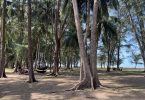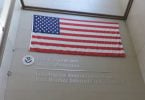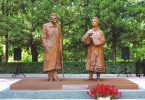BEIJING – The Chinese government has staged a national overhaul to axe overcharging in the admission tickets for tourist sites, banning further price rises in the coming 12 months and vowing to open most public museums, memorials and patriotic educational sites for free in two years.
The campaign began on April 9 and was made public Tuesday by the National Development and Reform Commission (NDRC), the top economic planner in charge of pricing, ahead of the international Labor Day holiday on May 1.
It will last through a summer tourism boom which industry analysts foresaw from an influx of tourists around the August Beijing Olympics and the growing habits of having annual vacations on home turf.
During the year-long overhaul, tourist sites are prohibited from charging more for either entrance or for transport such as cable cars, sight-seeing vehicles or yachts, said a NDRC statement with endorsement from seven other ministerial departments.
Tourism expert Wu Jiaoli with China’s top online travel operator Ctrip recognized the move as “positive in reducing consumers’ trip costs”. But the statement’s vague wording on what should be categorized as “overcharge” and how to measure the pricecuts have made her reluctant to gauge the move’s efficacy on boosting the tourism industry.
As China embraces a market economy and relies on market forces for pricing, tourist sites, especially cultural relics and scenic spots, are among the few exceptions that will still have their prices set by governmental departments.
Only a small fraction of artificially-developed cultural landscapes are allowed to be priced by investors or operators.
Chinese regulations have commissioned provincial economic planners to price for tourist sites but laid out only rough principles on the pricing criteria.
Significant cultural relics, large museums and renowned scenic spots and nature reserves, for instance, could be charged higher in principle to prevent depletive consumption. City parks, memorials and exhibitions closely relating to residents’ daily life should be priced lower with “full consideration” of the public’s financial power.
Researcher Wen Guifang of the Institute of Finance and Trade Economics of the Chinese Academy of Social Sciences maintained the government was justified in reserving its pricing power for tourist sites as the “caretakers of the legacies of nature and ancestors”.
“Such public resources should not be run for profits but be tapped as affordable public services accessible to all Chinese,” he said.
To crack down on profiteering, the NDRC has forbidden the malpractice by tourist sites of charging extra to give juicy kickback. The discount rate for entrance fees to traveling tours has been capped at 20 percent while the preferential treatment should not go beyond the officially designated group of people which include children, students, minors, senior citizens aged 65 or above, the enlisted, the disabled and religious personage.
xinhuanet.com





















